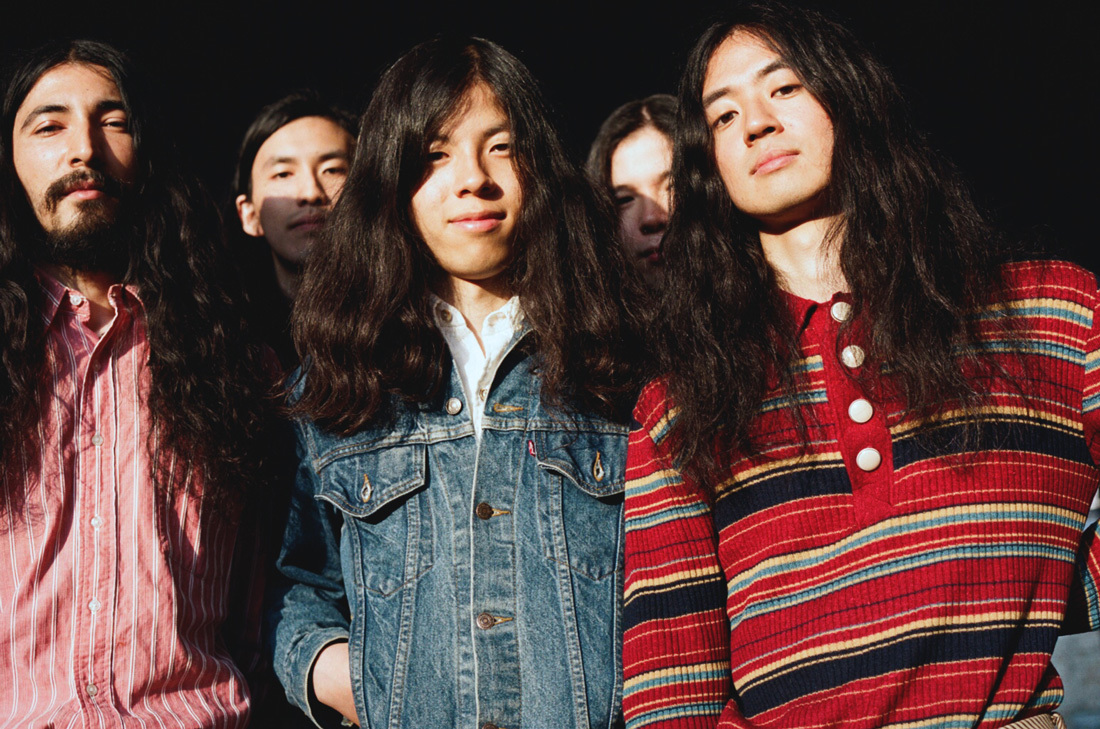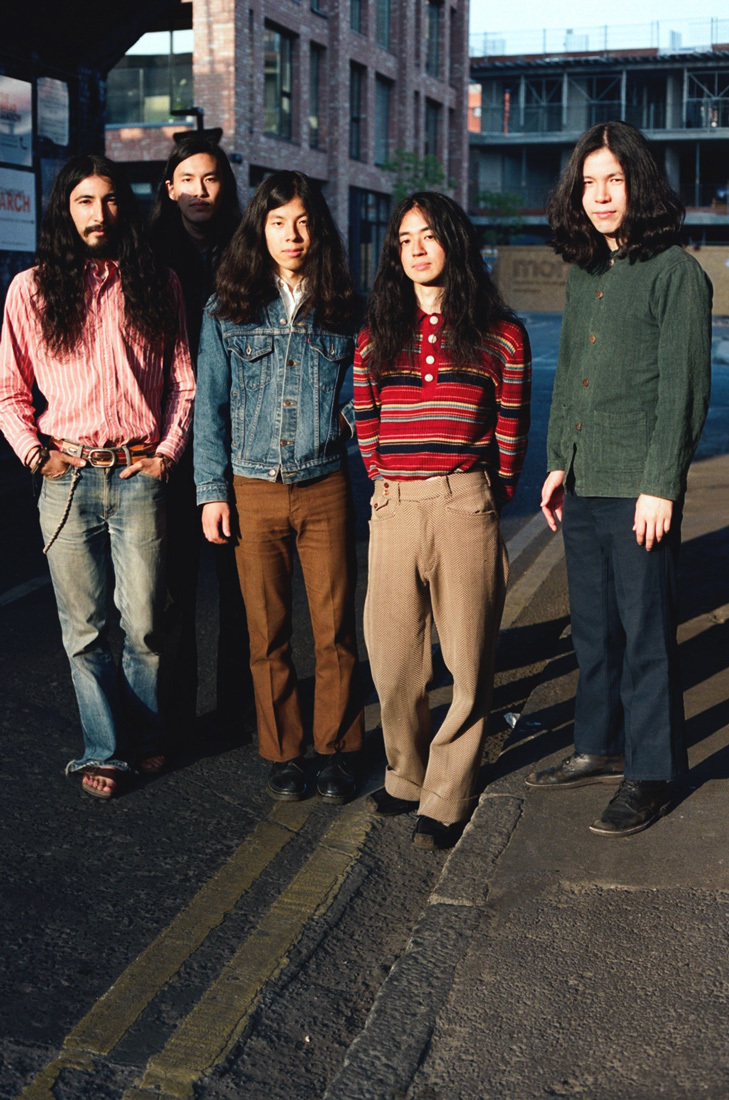Back in the 60s and 70s, psych was big in Japan. Adopting the sound and style of western bands, Japanese groups had the right idea but no gear, so to speak. Fast forward to today and with a sound that spans elements of 70s rock, folk, krautrock, and classical Indian, Kikagaku Moyo (or “geometric patterns” in Japanese) are the skilled five-piece making transportive music with the aim of freeing both the mind and body. In town for the London leg of their tour, we sit and eat apples with frontman Tomo Katsurada and drummer Go Kurosawa.
Hello Kikagaku Moyo! You’re currently on tour. Which countries have had the best reactions to your music?
G: America is crazy. People are super excited and drunk and not really listening.
T: When we play in Japan it’s the total opposite.
G: In Japan you’re not supposed to talk when somebody’s playing. So it’s good that we get people listening to us, but at the same time we get more nervous.
T: Yeah it’s like so judgey. People stand there tweeting about if it’s good or not.
G: But in Europe it’s different… England is really fun to play in. Maybe because of the rock ‘n’ roll culture.
What’s the psych scene like in Tokyo these days?
G: It’s pretty small.
T: Yeah, there aren’t many psych bands right now actually… us and maybe older people like Acid Mothers Temple. But I guess with younger bands, there’s Minami Deutsch.
They’re signed to your label, GURUGURUBRAIN, aren’t they? So in a way, you’re kind of curating the scene yourselves, signing the people you like and keeping it alive?
T: Yeah! We’re looking at bands from other Asian countries too — there are so many hidden treasures and really great stuff.
Tell us more about the label.
G: Well, we focus on the Asian music scene. For us and other Asian bands it’s seen as successful to sign to a label from the US or Europe because it’s the main market, but we thought it was time to do something by ourselves.
T: And as we’ve played as a band and toured in the US and Europe ourselves and got to know a lot of people and distribute all over the world, we’re really trying to make it easier for other bands to do the same.
Within psychedelia, do you notice a difference in style depending on which city it’s from?
G: Yeah, even between Tokyo and Osaka. Bands tend to be more crazy, far-out, and extreme in Osaka. Tokyo is more reserved.
Why do you think that is?
G: Osaka has, like, more spirit and pride. It’s the second biggest city, so they’re like, fuck Tokyo!
T: So they made a different style so they stand out.
G: They think that people in Tokyo are so hip and always trying to be cool. Yeah, Osaka has a really good music scene.

It’s interesting that while there has been a big psychedelic music scene in Japan, there’s never really been a drug culture that would typically go hand in hand with it.
G: Yeah, not so much compared to Europe or the US. I think it’s like, we grew up listening to music from the US and UK since we were kids and we know about the psychedelic culture from the 60s and the hippie movement. Japan had that in the 60s too, but not so much the ideology, more just the style. Obviously they had the Vietnam war and stuff, which we haven’t had, but today it’s almost like we imagine that we’ve seen those bands and that we use drugs. But we don’t, so it’s like, what should we do? We tend to be super extreme with our music because we don’t know like, the limit… we don’t know how we would play on acid.
T: Yeah, we use our imagination.
G: We just like how psychedelic rock bands from the 60s use different instruments; they’re open to mix different genres and sometimes even spoken word, merging heavier and folky styles… they were so free.
You started up the Tokyo Psych Festival a few years back, didn’t you?
G: Yeah, basically when we moved back from the US we started a band and realized that there was nothing going on for us to participate in, so we started putting on our own events and trying to discover similar bands. But the people coming to the show were either foreigners or older people; not so many young Japanese people were interested, so now we have a stage at the Liverpool Psych Fest instead.
Do you think that interest might be growing, as time goes on?
T: Yeah, it’s beginning, just a little bit.
G: We always get music trends later in Japan… so maybe when in Europe psychedelic music is not popular anymore, it will come to Tokyo and people will have to come over and play shows there!
What do the other music scenes in Tokyo think of you guys?
G: Because we didn’t play many shows in Japan, some people even think we’re from a different country. It was really natural for us to just go abroad and tour because in Tokyo you have to pay to play.
You have to pay to play shows?
T: Yeah, the Tokyo promoter system is totally different to anywhere else. There are no promoters booking small bands.
G: It just isn’t not happening. But the good side of it is that if you pay, you can play anything you like, anywhere you like.
T: So maybe that’s the reason that we have really good experimental music. Because it would usually be difficult for promoters to put on shows for extreme bands.
Where would you recommend that someone that someone going to Tokyo goes to experience live, psychedelic music?
G: There is a really cool rehearsal studio called DOM in Koenji, which is a little out of the center and where we live. It’s really cheap, like five or eight bucks which is really accessible.
T: Usually the shows in Tokyo, even the local shows, the bands which you don’t know, it’s costs like 25 bucks. It’s really expensive so nobody really goes, only friends!
G: There are so many people who never go to gigs.
It’s such a different culture over here. What would you say your major influences are at the moment?
T: Movies. I really like movies. I always watch them with our bassist.
What kind of movies?
T: B movies and bad sci-fi. Recently I got tired of watching experimental 60s arthouse movies. I started to find it kind of boring and then started watching a lot of fantasy films from the 80s; they’re so trippy. Everything happens without explanation, costumes are handmade, and they’re full of strange creatures and stuff. Like NeverEnding Story… typical stuff you know. Bad fantasy movies are really good.
If your discography was a soundtrack for a movie, which movie do you think it would fit best?
T: Something by Sergei Parajanov. He made movies in the 60s and 70s with beautiful costumes and stories based on the people living in Kazakhstan and Russia. They’re set in the really beautiful forest areas and there are lots of ritual type things.

Next time you’re bored you should re-dub his films with your music. Tell us about your vocals. What language is it?
G: Well it’s not Japanese. We just sing sounds.
T: Yeah, we don’t really want too much meaning in our songs.
G: It’s up to the listener. Sometimes it has meaning but it depends on what’s happening when I’m singing.
So the meaning changes?
G: Exactly. For each show, each record, I have a different visual in my head when I play.
House in The Tall Grass seems calmer than your past releases.
T: Well we wanted to have that kind of sound because the last record that we did, Forest of Lost Children, was glossier and this time we wanted to make music as if the listener was listening to it from far away. We had this image of an isolated house in the snow; looking at the house from different perspectives, with the snow between you and the music absorbing all the sounds.
In an ideal world, what do you want your audience to feel and think?
T: We just want them to have a good time… or maybe even sleep while we are playing.
That would result in some special dreams.
T: Yeah, sleeping or just imagining things. It’s really a big pleasure if we can inspire someone to create something. Sometimes people send us pictures or drawings, which is really good for us. We love the feedback back and forth — the exchange of energy.
What’s the last dream that you remember having?
G: Our sitar player just shared one that he had a few days ago. He was riding a bike and it suddenly went up through the air…
T: Like E.T.
G: Yeah, and he was going towards the moon and he got closer and closer until he went into the moon and discovered it was the yolk of an egg. And then he woke up.
Amazing. Finally, how often do you guys get your hair cut?
T: Once a year. My hair is so thick and in the summer it’s so hot that I have to cut it a little bit to get more air. But in the winter it’s going to be like a scarf, so it’s pretty warm. That’s how we survive!
Credits
Text Francesca Dunn
Photography Lily Rose Thomas
